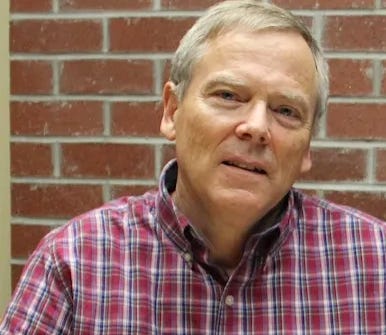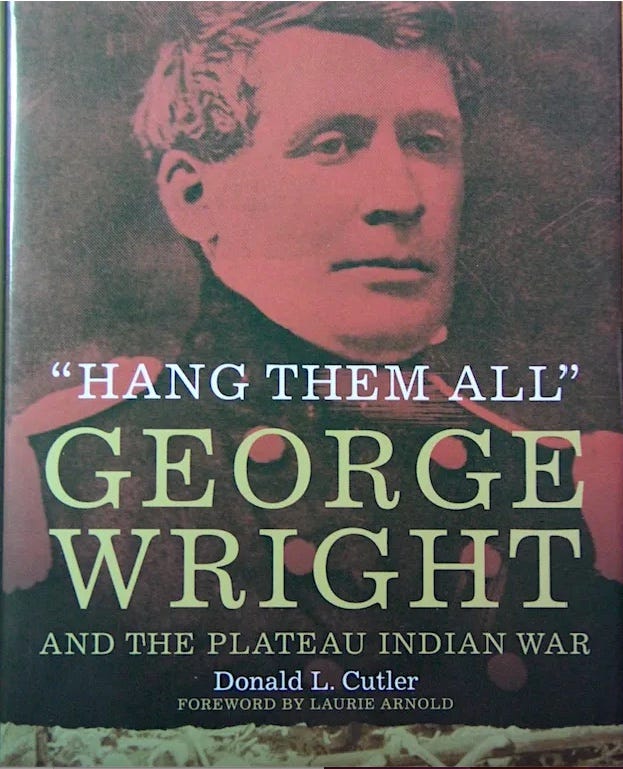Sunday's postcard, and Spokane writer Don Cutler on why the darkest chapter in Washington history still matters
April 30.2023
Arrowleaf balsamroot, spring’s wild and visual alarm clock, at peak bloom
The lingering questions, and moral footprints, of an uneasy peace
Before I visited him this past Friday, my previous interview with Don Cutler took place just weeks before Donald Trump moved into the Oval Office, in early 2017. Don’s meticulously researched book “Hang them All,” George Wright and the Plateau Indian War had just been published by the University of Oklahoma Press. He was fresh off the experience of building and delivering what, for many, was a discomforting examination of the roots and consequences one of the most ugly chapters of U.S. history—Col. Wright’s bloody campaign to subjugate the Native Americans of the interior Northwest.
Spokane writer Donald Cutler, author of “Hang Them All” George Wright and the Plateau Indian War (2016)
Five years later (now) I asked to do a followup interview, to reflect not just on developments since the book’s publication but the rising pushback against books, like Hang Them All, that challenge us to think more deeply and more honestly about our history. You can listen to the April 28th interview here. It begins with Don sharing one of the more remarkable responses he received to the book, from a fellow passenger on an airplane.
Cutler on calling-out terrorism: “People deserve self-determination. Regardless of whether you think they would have been better off, they didn’t deserve what Wright did, and that’s just the bottom line. What he did was just flat out wrong. People have asked, in a more general sense, “is this trying to rewrite history?” And “you have to consider what happened in the context of the times.” Even in the context of the times Wright’s tactics were considered cruel. He himself said he was trying to strike fear and terror into the people. And that, in any point in human history, if somebody is trying to terrorize people I think that needs to be called out.”
Apart from mobile howitzers and a new generation of combat rifles, Wright’s 1858 campaign relied on a willful performance of brutality—terrorism. Though it was credited by a mostly grateful white population for bringing a peace (or at least the appearance of peace) there was and is no escape from the dark heart of the story—the use of lethal violence to intimidate not just combatants but Native American society as a whole. Part of what I admire about “Hang Them All” is that Don doesn’t hide his motivation for writing the book. His preface takes us to the Four Lakes Battlefield “peace” memorial where he reads the inscription on the 10-foot-high granite obelisk, and asks himself the question—essentially, “peace for whom?”
On whether “Hang Them All” would be assailed as “wokeism” if it were published today:
“Yeah, I think it would be—held up as ‘wokeism,’ sure. And I hope it would be. I would wear it as a badge of honor.”
I published our 2016 interview in two parts, and you can still listen to it, here at my Rhubarb Skies website, along with a longer introduction to Don’s path and approach to writing “Hang Them All.”
A lot has happened since “Hang Them All” came out. On a positive note, Fort George Wright Way—the major thoroughfare connecting two college campuses to downtown Spokane and a major bridge over the Spokane River—has changed names. It’s now Whistalks Way, named for the wife of Qualchan who famously confronted Wright and his soldiers the same day Wright publicly executed Qualchan by hanging at an encampment on Hangman Creek (Latah Creek). Among those who had worked for decades to rid the thoroughfare of Wright’s name was Spokane Native American leader and activist Deb Abrahamson who, lamentably, passed away just a few months before the name change became official and embossed on new street signs in August of 2021.
But it’s also true that the Trump presidency—under the “Make America Great Again” banner Trump continues to promote—is a surreal and defiant campaign not just to re-impose the triumphalism of conquest, but to advance and inflame the absurd notion that Caucasian Americans are being abused by virtually any effort to redress, let alone acknowledge, the legitimate grievances of non-whites, including Native Americans.
One footnote: in one of my last questions I reference a 1991 journal article from the eminent, Spokane historian John Fahey who passed away in 2004. Here’s a pdf copy of it, Power Plays, The Enigma of Little Falls, if you’re interested
Fahey:lf Wwp
11.1MB ∙ PDF File
On George Wright and Washington’s first Territorial Governor (1853-1857):
“George Wright was a lightning rod. His campaign was theatrical and brutal and it really garnered a lot of attention back in the 1850s, and ever since. But I also think it might be worth revisiting some of the other issues that have impacted people over the years. Primarily I’m thinking about the things done by Isaac Stevens with the treaties he led. More than any other person Issac Stevens probably did more damage to native people than anybody else I can think of, that I ran across in my research.”







